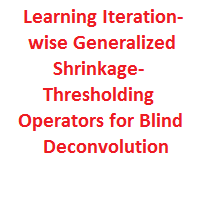ABSTRACT:
Notable edge choice and time-shifting regularization are two vital systems to ensure the accomplishment of most extreme a posteriori (MAP)- based visually impaired deconvolution. Be that as it may, the current methodologies for the most part depend on painstakingly planned regularizers and high quality parameter tuning to get palatable estimation of the obscure bit. Numerous regularizers display the structure-protecting smoothing capacity, yet neglect to upgrade notable edges. In this paper, under the MAP structure, we propose the emphasis astute ℓ p – standard regularizers together with information driven procedure to address these issues.
To begin with, we expand the summed up shrinkage-thresholding (GST) administrator for ℓ p – standard minimization with negative p esteem, which can hone notable edges while stifling minor points of interest. At that point, the emphasis shrewd GST parameters are determined to permit dynamical notable edge choice and time-differing regularization. At last, rather than handmade tuning, a principled discriminative learning approach is proposed to take in the iterationwise GST administrators from the preparation dataset. Besides, the multi-scale plot is produced to enhance the proficiency of the calculation.
Trial results demonstrate that, negative p esteem is more viable in evaluating the coarse state of obscure portion at the beginning time, and the scholarly GST administrators can be very much summed up to other dataset and genuine foggy pictures. Contrasted and the best in class strategies, our technique accomplishes better deblurring results regarding both quantitative measurements and visual quality, and it is significantly quicker than the best in class fix based visually impaired deconvolution strategy.
BASE PAPER: Learning Iteration-wise Generalized



